Pronouns: New UCL Microsoft Teams Feature!
By b.isibor, on 3 July 2023
The MS Teams platform at UCL now includes a pronoun feature, promoting a more inclusive environment for students and staff. While asking individuals for preferred pronouns is always recommended, this addition is a useful tool, particularly for a widely-used platform among UCL students and staff.
What are pronouns?
According to Central EDI at UCL, pronouns are used to refer to someone or something that is being talked about, for example, “she”, “them”, “this” and “it”.
We use gender pronouns (e.g. “she/her”, “he/him” and “they/them”) to refer to people without using their names. We may assume a person’s gender based on their name, appearance, voice, and/or expression, and “assign” a pronoun, however, this may not always be correct.
Why are Pronouns Important?
Gender pronouns might not seem important to those who have never had to worry about them. However, for people who face frequent gender-related inquiries or are misgendered, it is important to specify or share their pronouns. Feeling left out and isolated can be a very difficult experience to cope with.
Some individuals may relate to genders that differ from the sex they were assigned at birth. Additionally, some individuals may not identify with any particular gender, while others may identify with multiple genders.
How can you Add Pronouns on Microsoft Teams?
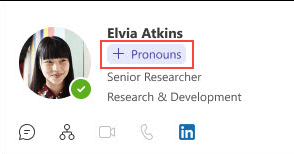 Adding your pronouns on Teams is an easy 3-step process. First, click on your circle image or initials located in the upper right corner. Second, click on your name and email. Finally, select “add pronouns” and add your preferred pronouns accordingly.
Adding your pronouns on Teams is an easy 3-step process. First, click on your circle image or initials located in the upper right corner. Second, click on your name and email. Finally, select “add pronouns” and add your preferred pronouns accordingly.
For a visual demonstration, read the Microsoft instructions.
The EDI Celebration 2023: The Award Winnners!
By b.isibor, on 3 July 2023
The Faculty EDI awards recognises an individual or group whose activities are impassioning, influencing, and leading positive change, making the Faculty of Brain Sciences or the wider UCL community a more inclusive place to work and study. The winners of the EDI Awards were announced at the Faculty of Brain Sciences EDI Celebration 2023. Across the Faculty, 85 individuals were nominated for their outstanding contributions to equality, diversity, and inclusion.
Below are the categories and their respective winners:
- Dean’s Excellence in EDI Award
This award recognises an individual or group that has been a catalyst for change and has generated intentional, sustained, impactful, and/or innovative EDI efforts. Efforts can be related to mentoring, advising, community building, teaching, outreach, research activities, hiring/recruitment, department climate, retention, reducing systemic barriers, developing equitable policies — anything that promotes EDI excellence.
Winner: Natalie Marchant- Division of Psychiatry
Natalie Marchant is a trailblazer promoting equality, diversity, and inclusion within UCL’s Division of Psychiatry. Natalie has founded and led the Race Equity and Ethnic Diversity group and chairs the EDI committee. Natalie has initiated innovative projects such as the creation of Divisional In2Science internships and name-blind recruitment for research Grade 6b posts and has created working groups to deliver on these, inspiring her team and supporting junior colleagues. Her values and behaviours have resulted in positive change towards a more inclusive environment.
2. Contribution to EDI in Leadership Award
This award recognises an individual or group whose activities are impassioning, influencing, and leading positive change, making the Faculty of Brain Sciences and the wider UCL community a more inclusive place to work and study.
Winner: Stefanie Anyadi- Division of Psychology and Language Sciences 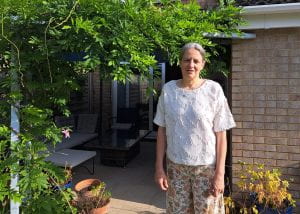
Stefanie’s leadership in actively promoting diversity and challenging implicit bias through her Caleidoscope project has been successful. Stefanie’s commitment to this important project has remained steadfast despite challenges brought on by the pandemic. Through her workshops and training methods, Stefanie has shared her vision and inspired the wider UCL community and abroad at Utrecht University in the Netherlands.
3. Contribution to EDI in Education and Student Experience Award
This award recognises an individual or group that has developed innovative teaching, learning, and/or assessment practices or other initiatives that advance inclusive education for diverse students and contribute positively to the student experience.
Winner: Tim Young, Tracy Skinner, Jessica Jiang, Benito Maffei, E’Jane (Yi Jie Li), Kangxin Chen Huang, and Mena Farag- Institute of Neurology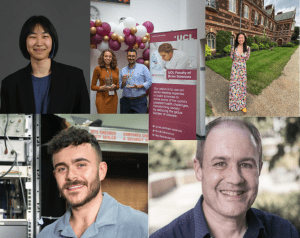
This group comprises active Institute of Neurology (IoN) EDI Action Group members, representing all student categories. They have made significant contributions by conducting the IoN student survey on wellbeing, mental health, and career development, organising ‘Paths to PhD’ events, and providing Active Bystander training for students. These initiatives have positively influenced the progress of EDI across different demographics and increased engagement to promote EDI.
5. Contribution to EDI in Research Award
This award recognises a person who has taken the opportunity to engage with staff, speaking openly about their personal experiences in a visible forum that encourages and champions diversity and inclusion in a way that new and existing staff can relate to.
Audrey Zhang- Division of Psychology and Language Sciences
Audrey conducted a research project exploring the ‘Effects of Personal and Contextual Factors on Status and Belongingness of First-year Undergraduate Students.’ Audrey administered questionnaires to Psychology students three times and found that mental wellbeing, extraversion, and openness positively contribute to their sense of belonging. Audrey’s research provides useful information for university administrators to improve student success and promote EDI.
- Contribution to EDI in International Community Award
This award recognises an individual or group that regularly goes above and beyond, making a positive difference to the embodying its ever-growing international community through celebrating culture and/or creating and contributing towards innovative projects and activities that enhance the experience of UCL’s international community.
Winner: Angela Hwang- Institute of Neurology
Angela founded the first epilepsy genomics project in the Democratic Republic of Congo, focusing on analysing the genomes of diverse groups of people with epilepsy. Angela’s research aims to compare the genetic architecture of epilepsy in African populations, particularly in resource-limited settings. Angela’s work has earned her the NIHR pre-doctoral fellowship in 2022 and is a testament to her remarkable drive and passion for improving healthcare.
6. Contribution to EDI in Innovation and Enterprise Award
This award recognises an individual or group who has significantly contributed to EDI using innovation and enterprise activities that led to an inclusive and equitable impact for students and/or staff at FBS and beyond.
Winner: Georgia Pavlopoulou, Irina Nedelcu, and Ruth Moyse- Division of Psychology and Language Sciences.
Georgia, Irina, and Ruth developed new training curricula to address the wellbeing of autistic people through enhanced access to mental health support and recovery plans. The program’s success in England and the South-East has led to a national roll-out funded by NHS England for all ages in various settings. It’s a remarkable and inclusive training module with key topics around neurodiversity and its impact on the workplace and post-graduate courses.
Brain Sciences Celebrates EDI Achievements
By b.isibor, on 3 July 2023
The EDI Celebration Awards 2023 event aimed to recognise individuals who are contributing to equality, equity, diversity, and inclusion at Faculty of Brain Sciences and beyond. The event celebrated the achievements of approximately 85 nominated individuals across the Faculty. 
The awards ceremony began with an opening speech by Professor Anna Cox, who serves as the Vice Dean for EDI. Anna emphasised the significance of EDI in the learning and work environments and the importance of celebrating success as progress is made. Leadership plays a crucial role in achieving this success, leading to the presentation of the first award category, ‘Contribution to EDI in Leadership.’ The winner was Stefanie Anyadi, who has actively led a project to promote diversity and challenge implicit bias through their Caleidoscope project. Through their workshops and training methods, they have successfully shared their vision and inspired the wider UCL community and abroad at Utrecht University in the Netherlands.
Next, Dr Steven Bloch, the Vice Dean for Education, briefly spoke about the significance of inclusive practices in education and how they benefit the learning environment at UCL. He then presented the award for ‘Contribution to EDI in Education and Student Experience.’ The winner was the Institute of Neurology (IoN) EDI Action Group, including Tim Young, Tracy Skinner, Jessica Jiang, Benito Maffei, E’Jane (Yi Jie Li), Kangxin Chen Huang, and Mena Farag who have made significant contributions by conducting the IoN student survey on wellbeing, mental health, and career development, organising ‘Paths to PhD’ events, and providing Active Bystander training for students.
 Professor Courtenay Norbury, the Vice Dean for Research, then recognised the work of researchers across the Faculty and specifically praised the establishment of the Centre for Equality Research in Brain Sciences. Courtenay then presented the award category ‘Contribution to EDI in Research.’ The winner of this category was Audrey Zhang for conducting a research project that explored the ‘Effects of Personal and Contextual Factors on Status and Belongingness of First-year Undergraduate Students.’
Professor Courtenay Norbury, the Vice Dean for Research, then recognised the work of researchers across the Faculty and specifically praised the establishment of the Centre for Equality Research in Brain Sciences. Courtenay then presented the award category ‘Contribution to EDI in Research.’ The winner of this category was Audrey Zhang for conducting a research project that explored the ‘Effects of Personal and Contextual Factors on Status and Belongingness of First-year Undergraduate Students.’
After the Contribution to EDI Research award, Professor Lasana Harris, who serves as the Vice Dean for International, proceeded to present the award for ‘Contribution to EDI in the International Community’. to celebrate the substantial contributions of EDI in the global scene at Brain Sciences. This category was awarded to Angela Hwang, who founded the first epilepsy genomics project in the Democratic Republic of Congo, focusing on analysing the genomes of diverse groups of people with epilepsy.
Dr Joseph Delvin, former Vice Dean for Innovation and Enterprise, presented the award category ‘Contribution to EDI in Innovation and Enterprise.’ He emphasised that innovation and enterprise are crucial in achieving the Faculty’s vision for solving brain science’s greatest health and wellbeing challenges. The category was won by Georgia Pavalopoulou, Irina Nedelcu, and Ruth Moyse, who led the development of the new training curricula to address the wellbeing of autistic people through enhanced access to mental health support and recovery plans as a part of a national rollout in England and the Southeast.
Lastly, Professor Alan Thompson, the Faculty Dean, announced the Dean’s Excellence in EDI award winner, Natalie Marchant. Natalie was recognized for her exceptional leadership and involvement in promoting EDI initiatives and practices in the Division of Psychiatry. She initiated various projects, including the Divisional In2Science internships, name-blind recruitment for research Grade 6b posts, and founded and led the Race Equity and Ethnic Diversity group.
Alan wrapped up the ceremony by recognising the astounding accomplishments in advancing EDI across the Faculty. He highlighted the achievements of five departments with Athena SWAN Silver awards and one with Bronze, as well as the key departmental staff that included Directors of EDI, Inclusion Leads, Athena SWAN Chairs, and EDI Professional Services staff within each department. Additionally, he acknowledged the EDI Faculty staff team, including the Vice Dean EDI, EDI manager and coordinator, 5 Equity Leads, Equality research centre director, and BAME awarding gap lead, who provides guidance and supervision to Faculty-level EDI work. Alan pointed out that there is still much work to be done within the Faculty to address inequalities related to protected characteristic groups and achieve the prestigious Athena SWAN Gold awards as a measure of excellence. However, the prioritized investment in resources and the commitment of individuals and teams throughout the Faculty indicate positive progress in the right direction.
The post-event gathering was heartwarming as people interacted over delicious food and drinks to celebrate the accomplishments of nominees, finalists, and winners. The Faculty takes pride in staff and students involved in EDI for their unwavering dedication to promoting EDI and upholding good practices. Keep up the exceptional work!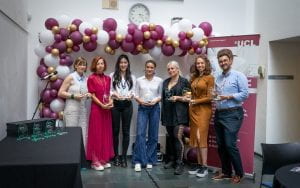
The ERB Centre: BAME students on Speech and Language therapy Training Programme.
By b.isibor, on 30 May 2023
The ERB Centre, also known as the Centre for Equality Research in Brain Sciences, offers funding and opportunities for research that promote equality, diversity, and inclusion.
Authors, Christina Smith and Rachel Reeves conducted a research project on exploring students’ experiences from Black, Asian and minority ethnic (BAME) backgrounds on a pre-registration speech and language therapy training programme.
They discovered, previous research with students from BAME backgrounds on physiotherapy training programmes identified themes that included: feeling like an outsider, lack of understanding of cultural and ethnic differences and lack of power and influence. The speech and language therapy profession has even fewer members from BAME backgrounds. Therefore, this study will aim to discover whether similar or different themes arise with speech and language therapy students.
All students on the MSc Speech and Language Sciences programme (approximately 120 students) were invited to participate in an online focus group if they identify themselves as being from a BAME background. Christina and Rachel recruited a research assistant not associated with the programme, to run the focus group with ten students, using a topic guide developed from the literature.
The Zoom platform was used to record the group conversation during the focus group. This will enable the generated high quality transcript automatically. The research assistant (supervised by the applicants) conducted an analysis on the transcript and took the lead in writing the report.
Ethical guidelines were followed. The student volunteers were asked for consent after being provided with the relevant information. Only the research assistant knew the names of the participants and, during the focus group, they instructed the participants not to use each other’s names. The recording was deleted once the anonymised transcription was completed.
Themes arising from the analysis indicate issues to be addressed on the programme and other programmes for health professionals at UCL and other higher education institutes.
To keep up with the latest news from The Centre for Equality Research in Brain Sciences (the ERB Centre), kindly visit their website. In case of any inquiries, feel free to reach out to fbs.edi@ucl.ac.uk via email.
FBS EDI Awards 2023: The Shortlist
By b.isibor, on 30 May 2023
The Faculty of Brain Sciences EDI Celebration aims to acknowledge and appreciate the exceptional work and contributions made by both staff and students toward promoting and impacting EDI over the past few years.
With six distinct award categories covering various areas of the Faculty, there is a wide range of opportunities for staff and students to be nominated and recognised.
This year, we received a total of twenty-four nominations across all categories.
Our panel of EDI Staff has shortlisted three individuals or groups for each category, from which a winner will be selected by the Faculty Dean and Vice Deans. The award winners will be announced during our EDI Celebrations scheduled for Monday, June 19th, 2023.
We are thrilled to share the exceptional staff and students who have been shortlisted for the awards:
Dean’s Excellence in EDI Award
- Natalie Marchant- Division of Psychiatry.
- Diana Sefic-Svara- Insititute of Ophthalmology.
- John Draper- Division of Psychology and Language Sciences.
Contribution to EDI in Education and Student Experience
- Tim Young; Tracy Skinner; Jessica Jiang; Benito Maffei; E’Jane (Yi Jie Li); Kangxin Chen Huang; Mena Farag- Institute of Neurology.
- Michael Foster- Institute of Neurology
- Vitor Zimmerer- Division of Psychology and Language Sciences.
Contribution to EDI in Leadership
- Stefanie Anyadi- Division of Psychology and Language Sciences.
- Benjamin O’Callaghan- Institute of Neurology
- Wing-Chau Tung- Insititute of Ophthalmology.
Contribution to EDI in Research
- Katerina Fotopoulou- Division of Psychology and Language Sciences.
- Leslie Gutman; Fatima Younas; and Rachel Perowne- Division of Psychology and Language Sciences.
- Audrey Zhang- Division of Psychology and Language Sciences.
Contribution to EDI in International Community
- Anouchka Sterling- Division of Psychiatry.
- Sushrut Jadhav- Division of Psychology and Language Sciences.
- Angela Hwang- Institute of Neurology
Contribution to EDI in Innovation and Enterprise
- Georgia Pavlopoulou and National Autism Trainer Programme Team- Division of Psychology and Language Sciences.
Congratulations, and good luck to all this year’s nominees!
Please note that name spellings were provided by those who were nominated. If any corrections are required, please contact fbs.edi@ucl.ac.uk.
Invitation for LGBTQ+ identified staff to participate in Faculty of Brain Sciences (FBS) Equity Interviews.
By b.isibor, on 4 May 2023
The Faculty of Brain Sciences Equality, Diversity & Inclusion Committee are running a series of one-to-one interviews to collect data on the experiences of LGBTQ+ staff. The interview will take place with a researcher online using MS Teams and will last around 60 minutes.
The Project Team are Prof Carolyn McGettigan (Principal Investigator) and Dr Nick Anim (Senior Research Fellow).
Data collected will inform FBS’ EDI action planning and will allow us to improve our understanding of the experiences of LGBTQ+ staff and students, so we can address inequities and create a more inclusive culture.
Specifically, the project aims to explore:
- Positive and negative experiences for LGBTQ+ staff and students.
- Perceptions and motivations of success, as well as any barriers in achieving them.
- Perceptions of belonging and the degree to which this is felt within departments, as well as the wider Faculty and Students’ Union UCL.
- Whether there have been experiences of discrimination on campus, and if so, how these have been addressed.
- Put forward recommendations/suggestions to improve the experiences of LGBTQ+ staff and students in FBS.
To participate in an interview, you must be:
- any member of staff in FBS (professional services / academic / research/teaching): if you’re unsure, see the list of eligible divisions and institutes below
- self-identify as LGBTQ+. Note: You do not need to provide any details of your specific LGBTQ+ identity OR have formally shared information about this with anyone at UCL.
If you would like to find out more, require information in alternative formats, and/or participate in an interview, email Nick Anim (nick.anim.12@alumni.ucl.ac.uk) by Friday 12th May.
Watch this short video from Carolyn with a few words about the motivation for the study.
This study has UCL Research Ethics Committee approval (Ethics ID Number: 22961/001)
Eligible Institutes and Divisions in the Faculty of Brain Sciences
- Division of Psychiatry
- Division of Psychology and Language Sciences
- Ear Institute
- Institute of Cognitive Neuroscience
- Queen Square Institute of Neurology
- Institute of Ophthalmology
- Institute of Prion Diseases (MRC Prion Unit at UCL)
- UK Dementia Research Institute at UCL
- UCL Institute of Mental Health
Welcome our New Faculty Equity Leads Sam & Elise
By b.isibor, on 3 May 2023
The Faculty of Brain Sciences is delighted to announce the appointment of our new Gender Equity Lead, Sam Gilbert, and our new Disability Equity Lead, Elise Crayton.
To provide you with an idea of who will be representing the interests of gender and disability equity at the Faculty level, we asked Sam and Elise to briefly introduce themselves and tell us what they are looking forward to in their respective roles.
Professor Sam Gilbert
I am a Professor at the Institute of Cognitive Neuroscience, currently working on the relationship between human memory and technology. I’ve been at UCL since coming here over 20 years ago as a PhD student, and a member of my divisional Career Development Equality and Diversity committee since 2016. In that time I’ve seen increasing work towards Gender Equity at UCL but clearly there is still a long way to go.
I am excited to work across the diverse institutes and departments in the Faculty to help co-ordinate actions, share best practice, and develop new initiatives.
Dr Elise Crayton
I am a Research Fellow at the Centre for Behaviour Change and the Faculty Disability Equity Lead. In my role as the Faculty Disability Equity Lead, I want to understand staff and student views on what the barriers and enablers are to disability equity and start to generate and implement recommendations for inclusive change. I am also looking forward to continuing the positive work carried out by those in post before me. I am here to help, so encourage you all to get in touch with any disability equity matters.
The Centre for Equality Research in Brain Sciences Launches
By b.isibor, on 2 May 2023
On Wednesday 19 April 2022, the UCL Faculty of Brain Sciences launched The Centre for Equality Research in Brain Sciences (ERB Centre) at UCL Central House.
The ERB Centre Director, Katerina Fotopoulou, introduced ERB’s vision and how it aligns with the Faculty of Brain Sciences EDI Strategy 2021-2026, along with a thorough overview of the ERB Centre’s mission, key activities, and governance structure.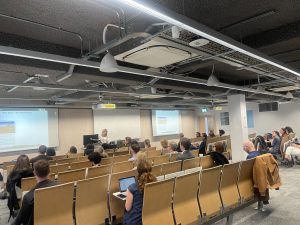
The centre was officially opened by Anna Cox, Vice Dean for EDI in Brain Sciences, streamed live to an online audience, complete with a digital ribbon-cutting ceremony.
Staff then presented their novel EDI research studies in Brain Sciences, funded by the EDI team in the previous academic year. These included Leslie Gutman’s study on workplace well-being during the pandemic, Patrizia Pezzoli’s presentation on inclusiveness in mental health research, and Audrey Zhang’s study on the impact of a discussion forum on the mental health of diverse groups of students.
Lasana Harris’ keynote address drove home the importance of EDI research, through his enthralling research on bias reduction.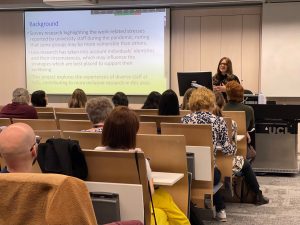
The day ended with networking, to give academics, journalists, researchers and many others the opportunity to discuss EDI research further, over canapés and drinks.
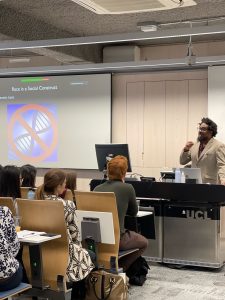 The ERB Centre Launch was an important milestone in the Faculty’s mission to enhance its EDI objectives and establish a fresh impetus for EDI within UCL and the wider society.
The ERB Centre Launch was an important milestone in the Faculty’s mission to enhance its EDI objectives and establish a fresh impetus for EDI within UCL and the wider society.
If you are interested in learning more about the ERB Centre, you can find information on the ERB Centre webpage.
International Day for the Elimination of Racial Discrimination
By b.isibor, on 3 April 2023
The Race Equity Lead, Bilal Malik answered a Q&A to mark International Day for the Elimination of Racial Discrimination on 21 March- find out what Bilal had to say below:
What does International Day for the Elimination of Racial Discrimination mean to you?
What are your ambitions as Race Equity Lead within the Faculty and what attracted you to take on this role?
Can you tell us about any race equity initiatives that you are involved in currently or any that are in the pipeline?
What can we do as a university to create a more equitable academic environment?
Are there particular lessons that universities could learn from other organizations or sectors?
How to be Inclusive During Ramadan
By b.isibor, on 3 April 2023
Ramadan Mubarak to Muslims across Brain Sciences observing and celebrating Ramadan.
What is Ramadan?
Ramadan is the ninth month of the Islamic calendar and fasting during Ramadan is the pillar of the Islamic religion. During Ramadan, Muslims worship Allah (God) through fasting which requires a person to refrain from consuming food and drinks from dawn until sunset every day for a month.
Tips to being inclusive during Ramadan:
Even if you are not observing Ramadan, there are a lot of things you can do (and some you might want to avoid) to make your workplace or learning environment a supportive and inclusive space for anyone who might be fasting and observing Ramadan.
Be curious, but positively curious!
Try to learn why your colleagues, students, or peers are fasting and observing Ramadan. It can be a simple ask or even a read on the internet- but if you ask, ensure you ask appropriately and at a convenient time. Being open to learning will increase your cultural competence, which is always a good thing in diverse environments such as UCL.
Flexibility goes a long way
While flexibility is already promoted within Brain Sciences, individualised flexibility during this period is important to maintain. If you are aware a colleague is observing Ramadan, offer any adjustments necessary where possible such as shortening meetings, avoiding scheduling meetings outside UCL hours (10 AM – 4 PM), and for line Managers- consider adaptations to break times.
Avoid micro-aggressions
Microaggressions are subtle examples of racism, prejudice, or bias that can be unintentional, but nonetheless very harmful. Microaggressions can be described in this context as “not even water?”, “If you have a little snack, will God be unhappy with you?”. As mentioned before, if you are curious, just ask respectfully.
Be aware exemptions exist during Ramadan
Be mindful that a Muslim may not be fasting at all or for certain periods of the month for different personal reasons. Some reasons a person may not be fasting can be; they are unwell, they are mensurating, they are pregnant, or they may suffer from a chronic illness. Being aware of such possible reasons that are considered sensitive and personal should prompt how you approach possible conversations with those observing Ramadan.
 Close
Close

